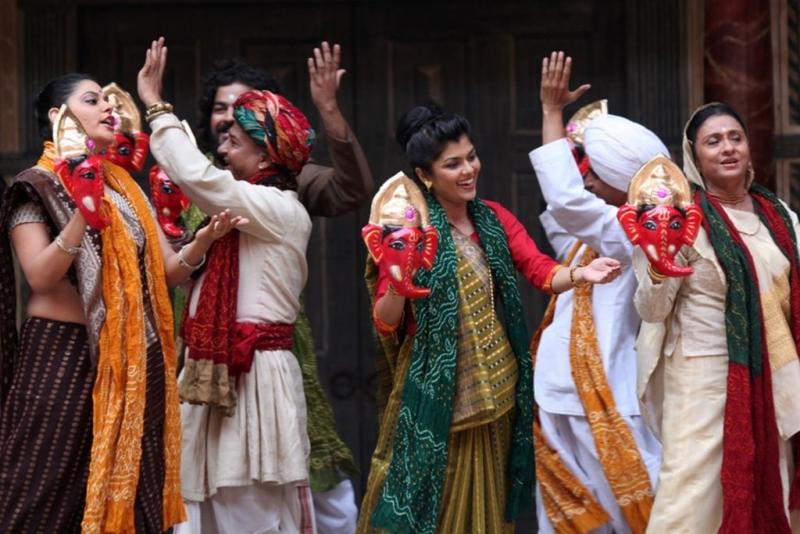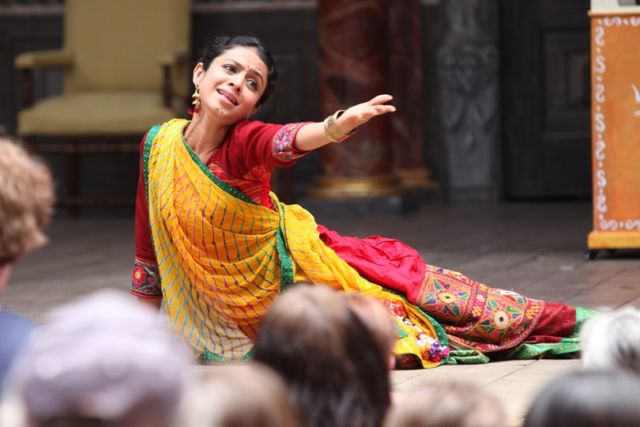Globe to Globe: All's Well That Ends Well, Shakespeare's Globe | reviews, news & interviews
Globe to Globe: All's Well That Ends Well, Shakespeare's Globe
Globe to Globe: All's Well That Ends Well, Shakespeare's Globe
Shakespeare's problem play solved by a buoyant Gujarati staging from Mumbai

It's both easy and fashionable to render ironic, or scoff at, the title of All's Well That Ends Well. This is the Shakespeare "comedy" in which the rabidly obsessed Helena finally ensnares her none-too-doting Bertram in a putative happy ending that tends to be played as if the pair are advancing toward the gallows.
For the troupe's success, credit adaptor Mihir Bhuta and the director Sunil Shanbag, the latter working for the first time in Gujarati (or so I was informed in one of the informal post-show confabs in the Globe's forecourt that have amplified the joys of this season). And honour, as well, the native traditions of the Indian theatre, whose keen embrace of movement and song added enormous weight to the singular quest of the lovesick Helena (known here as Heli) as leading lady Mansi Parekh was able to blossom from a girl to a woman in front of our eyes, a musical soundscape accompanying her every vibrant step of the way. (Three musicians sat to one side, playing harmonium, tabla, and dholak, the last two being the popular Indian hand drums.)
 And instead of the elevated world of the French court and the Italian wars that offer an escape valve for Bertram (here called Bharatram) from the predatory Helena, this early 20th-century All's Well moved from the village of Rosali to Bombay and on to Rangoon, the landscape one of mercantilism and the opium trade that nonetheless allowed for the differences in caste that permits Bharatram to cold-shoulder Heli. Always a tricky role given his snobbish impassivity, Chirag Vora's standoffish Bharatram elicited disapproving gasps from the audience as the narrative neared its defining "bed-trick". Then again, Parekh's radiant Heli (pictured above) scooped up all possible sympathy, especially when encouraged to give voice, both spoken and sung, to her cumulative humiliation.
And instead of the elevated world of the French court and the Italian wars that offer an escape valve for Bertram (here called Bharatram) from the predatory Helena, this early 20th-century All's Well moved from the village of Rosali to Bombay and on to Rangoon, the landscape one of mercantilism and the opium trade that nonetheless allowed for the differences in caste that permits Bharatram to cold-shoulder Heli. Always a tricky role given his snobbish impassivity, Chirag Vora's standoffish Bharatram elicited disapproving gasps from the audience as the narrative neared its defining "bed-trick". Then again, Parekh's radiant Heli (pictured above) scooped up all possible sympathy, especially when encouraged to give voice, both spoken and sung, to her cumulative humiliation.
Indeed, the women were granted a pride of place not often found in English-language stagings of this play, Nishi Doshi's Alkini a far more robust figure than Shakespeare's equivalent Diana. Given her own song with which to woo the crowd, Alkini became Heli's genuine ally, not just a plot device on the way to meeting the conditions that will force Bharatram's hand by play's end. And I loved the vigour of Utkarsh Mazumdar's Gokuldas, here not the King of France but a sharp-eyed merchant prince whom Heli cured of tuberculosis in a delicious scene in which Mazumdar circled the stage with gathering energy while Heli fueled him with pills. This same character, we have been told to sizeable laughs from the crowd, didn't think much of English medicine. Not, I would imagine, that he needed it, given the entirely curative tonic that was this show.
Share this article
The future of Arts Journalism
You can stop theartsdesk.com closing!
We urgently need financing to survive. Our fundraising drive has thus far raised £49,000 but we need to reach £100,000 or we will be forced to close. Please contribute here: https://gofund.me/c3f6033d
And if you can forward this information to anyone who might assist, we’d be grateful.

Subscribe to theartsdesk.com
Thank you for continuing to read our work on theartsdesk.com. For unlimited access to every article in its entirety, including our archive of more than 15,000 pieces, we're asking for £5 per month or £40 per year. We feel it's a very good deal, and hope you do too.
To take a subscription now simply click here.
And if you're looking for that extra gift for a friend or family member, why not treat them to a theartsdesk.com gift subscription?
more Theatre
 Tom at the Farm, Edinburgh Fringe 2025 review - desire and disgust
A visually stunning stage re-adaptation of a recent gay classic plunges the audience into blood and earth
Tom at the Farm, Edinburgh Fringe 2025 review - desire and disgust
A visually stunning stage re-adaptation of a recent gay classic plunges the audience into blood and earth
 Works and Days, Edinburgh International Festival 2025 review - jaw-dropping theatrical ambition
Nothing less than the history of human civilisation is the theme of FC Bergman's visually stunning show
Works and Days, Edinburgh International Festival 2025 review - jaw-dropping theatrical ambition
Nothing less than the history of human civilisation is the theme of FC Bergman's visually stunning show
 Every Brilliant Thing, @sohoplace review - return of the comedy about suicide that lifts the spirits
Lenny Henry is the ideal ringmaster for this exercise in audience participation
Every Brilliant Thing, @sohoplace review - return of the comedy about suicide that lifts the spirits
Lenny Henry is the ideal ringmaster for this exercise in audience participation
 Edinburgh Fringe 2025 reviews: The Beautiful Future is Coming / She's Behind You
A deft, epoch-straddling climate six-hander and a celebration (and take-down) of the pantomime dame at the Traverse Theatre
Edinburgh Fringe 2025 reviews: The Beautiful Future is Coming / She's Behind You
A deft, epoch-straddling climate six-hander and a celebration (and take-down) of the pantomime dame at the Traverse Theatre
 Good Night, Oscar, Barbican review - sad story of a Hollywood great's meltdown, with a dazzling turn by Sean Hayes
Oscar Levant is an ideal subject to refresh the debate about media freedom
Good Night, Oscar, Barbican review - sad story of a Hollywood great's meltdown, with a dazzling turn by Sean Hayes
Oscar Levant is an ideal subject to refresh the debate about media freedom
 Edinburgh Fringe 2025 reviews - Monstering the Rocketman by Henry Naylor / Alex Berr
Tabloid excess in the 1980s; gallows humour in reflections on life and death
Edinburgh Fringe 2025 reviews - Monstering the Rocketman by Henry Naylor / Alex Berr
Tabloid excess in the 1980s; gallows humour in reflections on life and death
 Edinburgh Fringe 2025 reviews: Lost Lear / Consumed
Twists in the tail bring revelations in two fine shows at the Traverse Theatre
Edinburgh Fringe 2025 reviews: Lost Lear / Consumed
Twists in the tail bring revelations in two fine shows at the Traverse Theatre
 Make It Happen, Edinburgh International Festival 2025 review - tutting at naughtiness
James Graham's dazzling comedy-drama on the rise and fall of RBS fails to snarl
Make It Happen, Edinburgh International Festival 2025 review - tutting at naughtiness
James Graham's dazzling comedy-drama on the rise and fall of RBS fails to snarl
 Edinburgh Fringe 2025 reviews: I'm Ready To Talk Now / RIFT
An intimate one-to-one encounter and an examination of brotherly love at the Traverse Theatre
Edinburgh Fringe 2025 reviews: I'm Ready To Talk Now / RIFT
An intimate one-to-one encounter and an examination of brotherly love at the Traverse Theatre
 Top Hat, Chichester Festival Theatre review - top spectacle but book tails off
Glitz and glamour in revived dance show based on Fred and Ginger's movie
Top Hat, Chichester Festival Theatre review - top spectacle but book tails off
Glitz and glamour in revived dance show based on Fred and Ginger's movie
 Edinburgh Fringe 2025 reviews: Alright Sunshine / K Mak at the Planetarium / PAINKILLERS
Three early Fringe theatre shows offer blissed-out beats, identity questions and powerful drama
Edinburgh Fringe 2025 reviews: Alright Sunshine / K Mak at the Planetarium / PAINKILLERS
Three early Fringe theatre shows offer blissed-out beats, identity questions and powerful drama
 The Daughter of Time, Charing Cross Theatre review - unfocused version of novel that cleared Richard III
The writer did impressive research but shouldn't have fleshed out Josephine Tey’s story
The Daughter of Time, Charing Cross Theatre review - unfocused version of novel that cleared Richard III
The writer did impressive research but shouldn't have fleshed out Josephine Tey’s story

Add comment